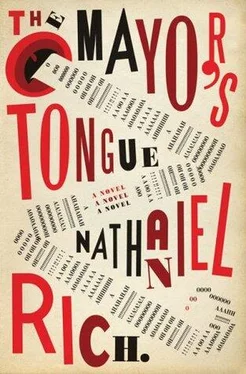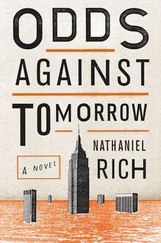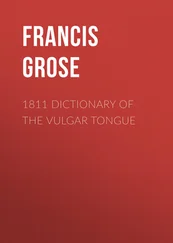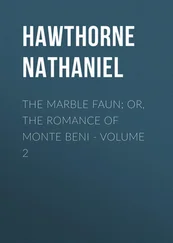Eugene could only recall, in fact, a single picture of his father as a young man. He had found it in an old photo album hidden in the hall closet, where they stored his mother's old belongings— a floral slip, a single pearl earring, a sketchbook from a life-drawing course she took in college, and a book of expired raffle tickets from Eugene's preschool. The photo album was, perhaps, the most telling of all the items there. It was filled with grainy pictures, framed by white upraised borders, of his mother's family. Eugene's father appeared in the background of one of these photos. Signor Brentani was standing with his wife's cousins on a sailboat, his hands on his hips. The Bay of Naples was a gray wash behind him. His face seemed to shudder with some kind of violent energy; his eyes were jumpy and his hair was wet and whorled. The horizontal bands of his shirt stretched outward like staves on a barrel about to burst.
Eugene imagined sitting on a wooden bench in the subway late one night and seeing his twenty-three-year-old father sitting there next to him. Would Eugene dare to talk to him? Perhaps they would notice that they were reading the same book: an Eakins novel, say, such as The Rude Violence of the Poor or — more appropriately— Dolman Hardy. "How do you like the book so far?" Eugene would ask his young father, nodding at the book. "The character of Dolman is vivid to me," the signore would reply, in perfect English. "I feel as if I know him, or have met him somewhere — yet I am sure I haven't had the pleasure!" He'd laugh nervously.
eugene brentani (age twenty-three): What did you think about the scene in the city, when the streets are empty — have you made it that far?
signor piero odolfo brentani (age twenty-three): Yes, it's marvelous. All of the people are inside, sitting at their windows and waiting for something to happen, when — let's see. . yes, here's the passage:
Their pale faces lined the avenue like dim streetlamps. Dolman wandered on, exhausted and febrile, hoping to find a hospitable stranger. But there was no candlelit beer-hall, no inn, not even a bordello to welcome him. With a growing sense of alarm, he realized that he had not yet seen even a single door.
eugene: That's it.
piero: Eakins was only twenty-three when he wrote that.
eugene: He had already fought in a war, and murdered a man.
piero: His whiskers grew nigh up to his eyes.
The two men would sit in mute appreciation of Eakins, and wonder privately if they had become friends. It wouldn't be long before they would realize, with a shock, their uncanny resemblance to each other. They would not converse further, but when the train finally arrived, they'd discover happily that they were getting off at the same stop.
But it didn't happen!"
When Eugene woke this time it was full morning and Abraham Chisholm was towering over him. His white hair flopped the wrong way over his head so that it hung over an ear, his lips were bright red with denture marks, he wrung his hands like claws — and he was shouting.
"It did NOT happen!" Chisholm was no longer slapping his leg. He was slapping his own face.
Eugene rushed to his feet, books cascading down his back and arms. The old man was holding two copies of the newspaper, one in each hand. He stared unseeingly across the room, his cheek inflamed scarlet.
"Alison!" he shouted. "Alison! Alison! ALISON!"
"It's just me," said Eugene. He backed away from Chisholm into the recesses of the room, his hands reaching for purchase as he stumbled over falling books and planted his sneakers into cardboard boxes.
"ALISON! ALISON! ALISON—"
"I'm here, Dad," said a voice from the doorway. The overhead lights went on.
"Ah, Alison. I don't understand. Why do they print this?"
"I don't know, Dad." She embraced him gently but he did not seem to notice. "I think you should calm down now," she said, in a voice so relaxed that it seemed robotic. She held his hand firmly to stop it from shaking. It looked as though she had experience in this.
"You'll have to go back to visit Connie."
"Dad, do you remember Eugene? The moving man. He's right there."
Eugene smiled at her.
"I see. . oh! Eugene, yes. And how has the moving gone?"
"It might take a little bit longer," said Eugene. "I have to admit I've been a bit distracted by all the books."
"The books, yes, of course. You do know what I'm doing here, with this new office?"
The telephone began to ring and Chisholm answered it with a howl. He had an unusual telephone manner. When he spoke, he held the apparatus straight in front of his face, his mouth directly on the receiver. This ensured that the person on the other end of the line would have no trouble hearing him, but had the disadvantage of forcing the earpiece so far from his ear that he couldn't himself hear anything that was said to him.
"Hello? No, no no, no, NO!" He shifted the phone so that the earpiece was even with the bridge of his nose. "He's very much alive. What? I can't hear you," he said, and abruptly hung up.
"They've been calling me all morning at home," said Chisholm. "The bastards."
With a start, he wrested free of Alison's grip and charged at Eugene, adroitly dodging Eakins detritus along the way. He didn't stop until he was only inches away from Eugene's face, and Eugene was backed against the wall. Chisholm's breath, that close, was shocking.
"Eakins is my friend and we keep in close touch. He has long avoided public scrutiny, you see, but we have a close personal relationship: we correspond regularly. Why, I received a note from him not three days ago!"
"You mean — Eakins is alive?"
"Of course. We correspond regularly. Alison visits him often, and she gives me reports. You see, I am too WEARY to travel.
How old do you think I am?"
". . Sixty?"
"WRONG! Seventy-four!"
All of a sudden a strange phantom seemed to overtake Chisholm's features. The corners of his mouth stretched back, his eyes squinted shut, his carbuncled nose wrinkled like a frightened snail, and his ears perked and turned mauve. If the process progressed any further, his skin might have retreated entirely off his skull, but at this moment his features froze. After several seconds, his hands began to grasp at the air, kneading invisible balls of clay. It occurred to Eugene that the old man was having a heart attack. Should he grab his chest, massage it? An enormous burst of noise issued from deep within Chisholm's belly. Then, with a gasp, he began to jiggle and nod uncontrollably. Spittle burst from his mouth and, it seemed, his nose. It dawned on Eugene that this was the old man's idea of laughter. Chisholm's eyes slowly opened, glassy and wet like two bivalves, and appealed mirthfully to Eugene to join in the fun. Eugene laughed hollowly, looking to Alison for help. She was staring out the window, as if lost in some private thought.
The phone rang. Chisholm turned and raced back to pick it up.
"Hello? No! Alive. Not dead! WHAT? Ah, hold on." He transferred the phone to his ear. "Yes. It's under way. 'Constance Eakins: A Life.' In three volumes, maybe four. Thank you." He slammed the phone down.
Chisholm's convulsions came to a rest and his voice grew somber. He turned to Eugene.
"You see, this is my life's final WORK."
Alison appeared relieved to see her father go back to slapping his leg, and not his face. Chisholm narrowed his eyes at Eugene.
"What does the moving company pay you hourly?"
"Nine dollars an hour, Mr. Chisholm."
"Call me Abe, son. Now understand this: Alison must leave in a week for Italy to meet with Connie. I will need an assistant. You are strong: a moving-type fellow. You need to make money. I have money. I can pay you. You know Eakins's work. You LIKE Eakins's work. You can help me. It will be a purely clerical position, I should say. But you will be able to be around. . all this." He repeated his flailing gesture, and in the process launched several volumes off the top of the nearest pile.
Читать дальше












